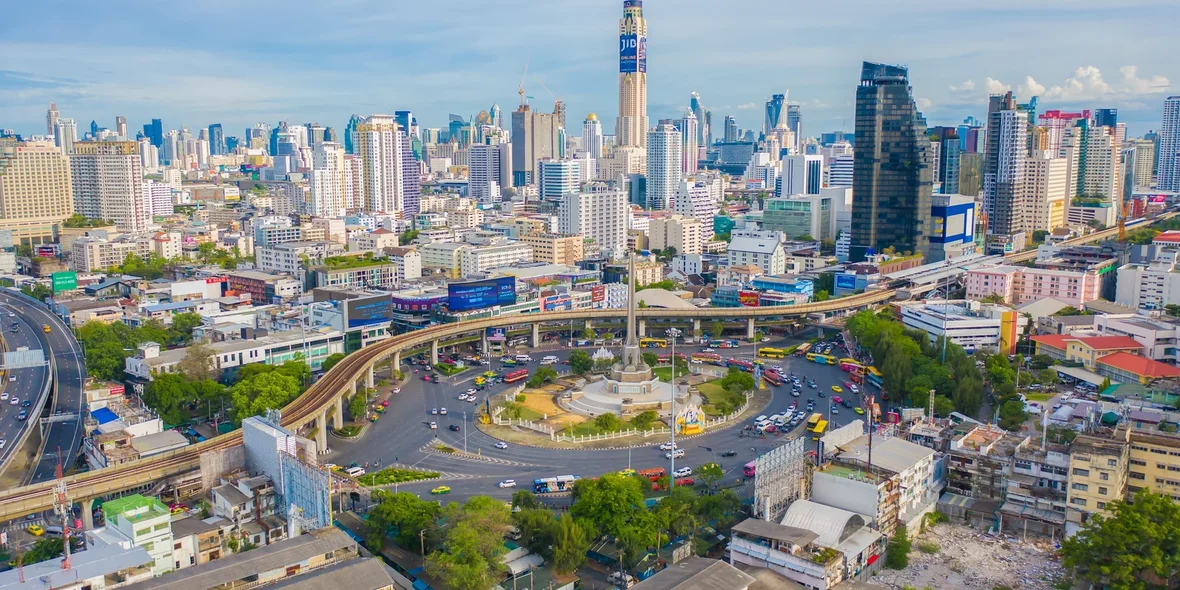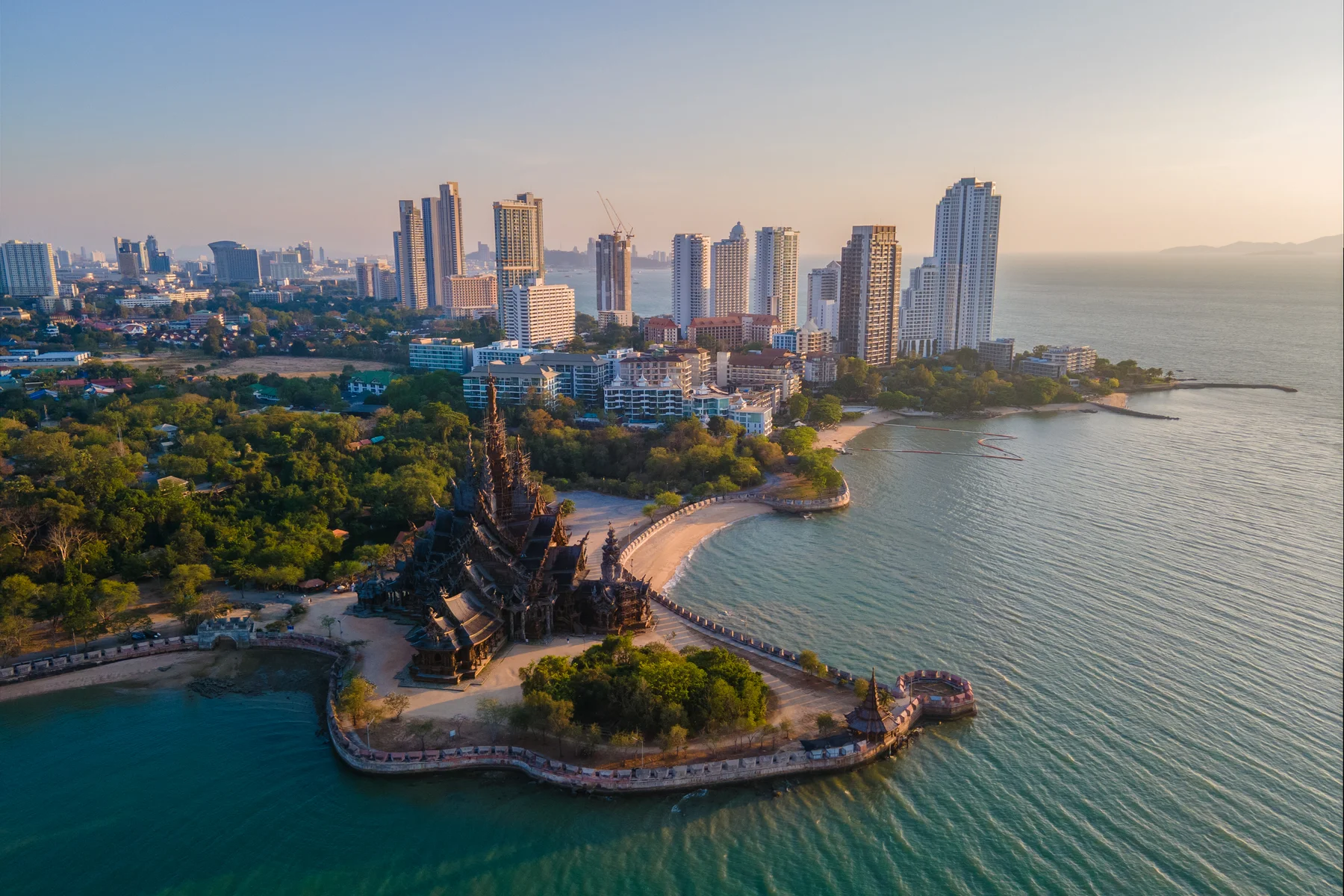
How and When to Pay Taxes in Thailand: An Up-to-Date Guide
Thailand’s warm climate with relatively cheap living costs draws billions of tourists and expats annually. However, spending more than 180 days in the country within a year triggers residency status, which requires individuals to pay taxes in Thailand. In the past, some tax residents exploited legal loopholes to sidestep income tax on foreign earnings. This prompted Thai authorities to overhaul the tax system in 2024–2025, introducing rules that directly impact residents’ overseas income.
In our article, we’ll explore who qualifies as a tax resident in Thailand, what rules they must follow, and how the new rules impact tourists.
Who is Considered a Tax Resident in Thailand?
Tax residency in Thailand is not based on citizenship or residence permits, but solely on the amount of time spent in the country. Therefore, foreigners planning to stay long-term are advised to keep track of their days in Thailand. Once the number exceeds 180 days, they are considered tax residents. If a foreigner frequently enters and exits Thailand, the tax authorities count the total number of days spent in the country over the year.
Tax residents are required to pay income tax on both local and worldwide income. Non-residents also pay income tax — but only on income earned within Thailand. This does not apply to tourists, although the local government is planning to introduce a tourist tax in Thailand by the end of 2025.
Income Tax for Foreign Nationals
Income tax in Thailand is a key component of tax obligations for tax residents. The tax is progressive and ranges from 0% to 35%. Before the new 2024 regulations, foreigners often avoided paying tax on foreign income by using a loophole: funds transferred to Thailand more than a year after they were earned were not subject to personal income tax (PIT) in Thailand.
For example, if an investor earned 500,000 baht (~$15,183) abroad and transferred it to a Thai bank account more than a year later, they weren’t required to pay income tax on it, since Thai tax policy only considered income brought into the country during the same year it was earned. Starting January 1, 2024, Thai authorities closed this loophole. Now, tax residents must pay tax on all foreign income, regardless of when the money is brought into the country.
Thailand’s income tax rates:
- Up to 150,000 baht ($4,555) — 0% (tax-exempt).
- 150,001–300,000 baht ($4,555—$9,110) — 5%.
- 300,001–500,000 baht ($9,110—$15,183) — 10%.
- 500,001–750,000 baht ($15,183—$22,775) — 15%.
- 750,001–1,000,000 baht ($22,775—$30,367) — 20%.
- 1,000,001–2,000,000 baht ($30,367—$60,734) — 25%.
- 2,000,001–5,000,000 baht ($60,734—$151,837) — 30%.
- Over 5,000,000 baht ($151,837) — 35%.
The tax rate is calculated based on annual income, which heavily affects those with high foreign earnings. For instance, in 2023, a digital nomad’s annual income ranged from $50,000 to $123,000, meaning they would owe 25% to 30% in taxes under the Thai tax system — quite a significant amount.
Tax residents can apply for a tax refund in Thailand only if they’ve overpaid during the year. Overpayment can happen if, for example, an employer withheld more tax than necessary. When filing a tax return, the individual must indicate the overpayment, and it will be refunded in full.
Double Taxation Agreements in Thailand
Corporate and personal income tax in Thailand can be quite high for foreigners. The Thai government acknowledges this and aims to reduce the tax burden through Double Taxation Agreements (DTAs).
These agreements allow individuals to pay tax in the country where the income was earned and then credit that amount against their tax liability in Thailand. For example, if a digital nomad earns $50,000 in Serbia and pays 15% income tax there, they can reduce their Thai tax rate from the standard 25% (for that income bracket) down to 10%. However, since Thailand does not have a DTA with Serbia, the individual would effectively be taxed on 40% of their income (paying full tax in both countries with no offset).
Currently, Thailand has DTAs with over 60 countries, including Russia, the United States, the United Kingdom, Canada, Germany, Japan, Singapore, the Czech Republic, Poland, and others. To benefit from a DTA, a foreigner must provide Thailand’s Revenue Department with documents proving tax was paid abroad, such as a certificate from a foreign tax authority or official payment receipts.

Tourist Tax (Coming in 2025)
Thailand is planning to introduce a tourist tax for foreign travelers. Although discussions have been ongoing since 2016, the implementation has been repeatedly postponed due to pushback from the tourism industry.
If enacted, the tourist tax will be 300 baht ($8–9) for travelers arriving by air, and 150 baht ($4–5) for those entering by land or sea. In the latter case, the tax can be paid once and used for multiple border crossings, although the exact validity period hasn’t been specified yet.
Payment will be available online via the Thailand Digital Arrival Card (TDAC) system, launched on May 1, 2025. This system replaces paper visas with a fully electronic arrival registration and visa issuance platform. There are rumors that airlines may include the tax in the ticket price to reduce bureaucratic hassle, but this has not been officially confirmed.
The tax won’t just be a money grab—it will include basic insurance coverage for accidents, emergencies, and unforeseen events like natural disasters, civil unrest, or acts of terrorism. However, it will not cover illnesses while in Thailand, so travelers are still advised to purchase separate medical insurance.
Exemptions from the tourist tax:
- Long-term visa holders (e. g., Elite Visa, Long-Term Resident Visa, work visas).
- Children under 2 years old.
- Transit passengers staying in the airport’s transit zone.
- Thai citizens and permanent residents.
- Diplomats and those with special status who must verify their exemption via TDAC or during flight check-in.
Additional Taxes for Foreigners
In addition to income tax and the tourist levy, foreigners in Thailand are also subject to Value Added Tax (VAT). Its rate is 7% and is included in the price of most goods and services. However, foreigners can get a VAT refund on purchases made in Thailand, provided certain conditions are met:
- Shop at stores displaying a “VAT Refund for Tourists” sign.
- Spend at least 2000 baht ($61) per store per day, with a trip total of 5000 baht ($152).
- Export the goods within 60 days of purchase.
- Present a passport at purchase to obtain a P. P.10 form (or e-P. P.10) and tax invoice.
- Goods for commercial use are ineligible.
Sample refund amounts:
- 2100 baht ($64) purchase: 80 baht ($2.43) refunded.
- 51,000 baht ($1,549) purchase: 2710 baht ($82) refunded.
- 200,000 baht ($6,073) or more: 6.1% of the purchase value.
Property-related taxes apply to foreigners owning or renting in Thailand, encompassing several levies:
- Transfer tax. A 2% fee on the assessed value for freehold property or 1% for leased property, paid at purchase.
- Ownership tax. A tax for residential property used for living or renting with 0.03% rate of property assessed value.
- Rental income tax. Income from renting or selling property is taxed as personal income. Commercial resale incurs an additional business tax of 0.5% for properties held over 5 years or 3.3% for those held less.
Other taxes and fees:
- Inheritance tax. It applies only to inheritances exceeding 100 million baht ($3,036,745) with a rate of 10% on inherited assets. It is lowered to 5% for direct relatives, such as parents or children. Spouses are not paying tax at all.
- Stamp duty. A 0.5% fee on the documented value or a fixed value based on agreement cost (1 baht ($0.03) per 1000 baht ($30) of value). Parties typically split the cost, though one may cover it by agreement.
Frequently Asked Questions About Taxes in Thailand
How can tourists get a VAT refund in Thailand?
Non-residents, including tourists, can claim a VAT refund for purchases made at stores marked with “VAT Refund for Tourists.” The minimum purchase per store per day is 2,000 baht (~$61), and the total purchases must be at least 5,000 baht (~$152) to qualify.
At the time of purchase, you must show your passport, request a P. P.10 form, and get a tax invoice. Goods must be exported within 60 days through an international airport. At the airport, go to the VAT Refund Office, present your goods along with the required documents and receipts.
Do I need to declare foreign income if I don’t transfer it to Thailand?
If you’re a tax resident, you are not required to declare or pay income tax on foreign income that is not brought into Thailand. The income becomes taxable only when transferred to a Thai bank account. However, if you make large purchases or investments in Thailand, tax authorities may request proof of the funds’ origin. If they classify it as income, you’ll need to pay tax on it based on Thailand’s progressive tax rates.
How does Thailand’s Double Taxation Agreement (DTA) work?
If Thailand has a DTA with the country where your income originates, you may reduce your Thai tax by the amount already paid abroad. For example, if your income is taxed at 15% in the U. S. and the applicable Thai tax rate is 25%, you would only need to pay the 10% difference in Thailand. If the foreign tax rate is equal to or higher than Thailand’s, you may owe nothing additional in Thailand.
Author
I write informative articles about real estate, investments, job opportunities, taxes, etc.






















